Our communities are under attack, and our safety is threatened. Our communities in the Eastern Coachella Valley are vulnerable because there’s already a lack of safe spaces and resources for our immigrant community.
Like many here, I grew up seeing la migra on a daily basis patrolling our homes. When we are threatened with walls and deportations what’s at stake is the separation of our families, the separation of our communities.
Our immigrant communities are the foundation of this nation, many who sacrificed everything by crossing man made borders so that their children could have a better life.
Our immigrant communities are the foundation of this nation, many who sacrificed everything by crossing man made borders so that their children could have a better life. They’ve contributed greatly to this nation and in return they yet are not given the credit or paid adequately or treated justly for their contributions.
I am the proud daughter of immigrant parents, the ones who’ve pushed me to go on with chants of si se puede. Their love and daily sacrifices is where I pull strength para echarle ganas y seguir adelante. When they threaten immigrant communities they threaten my source of vida and our existence. Sin la comunidad inmigrante esta nación no es nada, what’s at stake is our tomorrow.
When they threaten immigrant communities they threaten my source of vida and our existence.
For me sanctuary status would be a guarantee of our safety. Officials and leaders at every level need to make public statements that they will take action and put into writing that they stand with our immigrant community. They need to state that they don’t stand with the separation of families, that they don’t stand by policies that have given them the license to racially profile and criminalize and that they will not comply or share information with immigration agencies.
If we have all of our local officials and leaders in our community make public statements and put their words into writing and action for me it will make me gain some newfound hope that all politics isn’t just carefully crafted piece of words but that those elected people are actually there for our gente and it will make our efforts that much greater.
Check out this video from Youthwire of young people advocating for sanctuary status in communities across California.
About the Author:
 Olivia Rodriguez, 24, is from Thermal, Calif. She graduated from UC Berkeley in 2015 with a Biology degree. One of her favorite places in the Eastern Coachella Valley is the Mecca Park where you can find her playing basketball. At the end of a long day she loves spending time with her family in their garden enjoying a cup of unsweetened chamomile or hibiscus tea. View her author page here.
Olivia Rodriguez, 24, is from Thermal, Calif. She graduated from UC Berkeley in 2015 with a Biology degree. One of her favorite places in the Eastern Coachella Valley is the Mecca Park where you can find her playing basketball. At the end of a long day she loves spending time with her family in their garden enjoying a cup of unsweetened chamomile or hibiscus tea. View her author page here.
]]>
By Juliana Taboada
With school starting so soon, I feel that as students it’s very easy for us to forget the importance of prioritizing our well being. I know for me, personally, I tend to forget that I am a human being who needs as much attention as my school work does. In fact, I probably need more. It seems like when it comes to educational institutions, self care practices are never in the picture. In fact, many of us may not even know what self care means.
If this is your first time learning about what self care is, it is the practice of taking care of yourself and your well being. In other words, its about doing what makes you feel good both mentally and physically.
Self care is a revolutionary act. Being able to step back and take time for yourself is one the strongest things anyone can do. The idea that taking care of ourselves is selfish is ignorant and negative. Don’t allow this view to change your need to take care of yourself.
I believe, the more attention I give to my body, the more successful I am in everything. Keep in mind, self care isn’t a one time act. Self care is a constant activity that helps balance the mind, soul and body. So, here are my favorite tips for helping you start off the school year or everyday life on a brighter note:
Self Care Tip #1
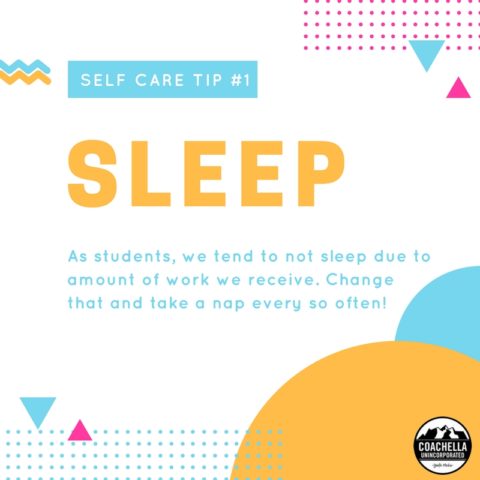
Self Care Tip #2
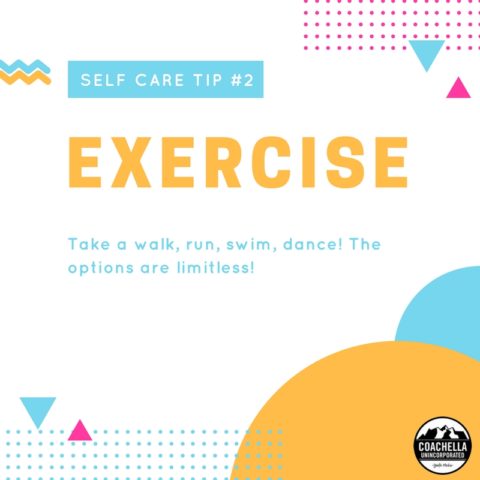
Self Care Tip #3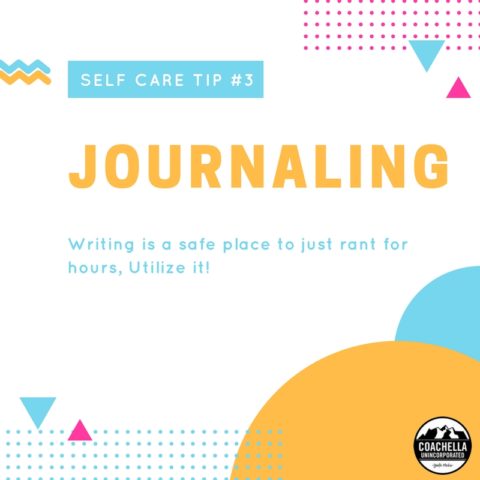
Self Care Tip #4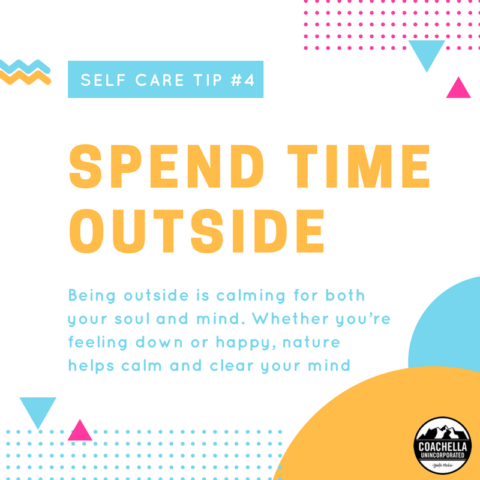
Self Care Tip #5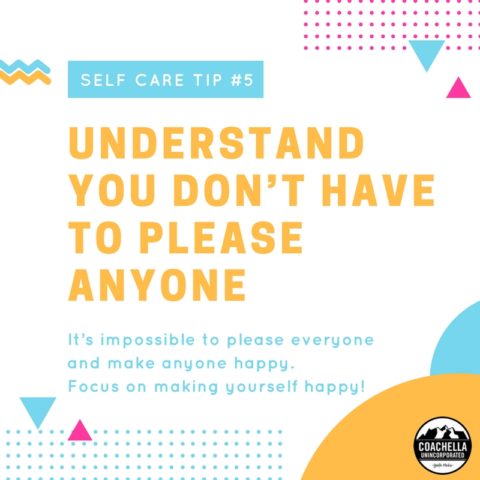
Self Care Tip #6
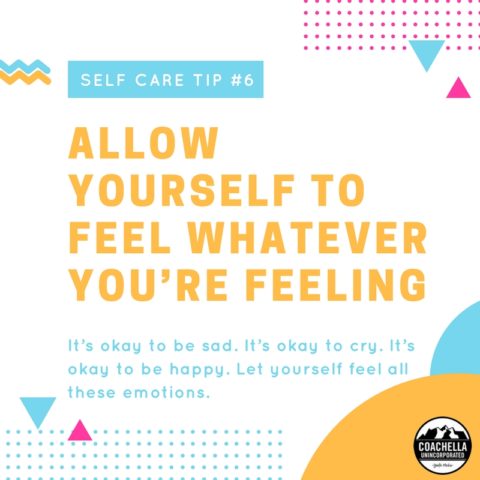
Self Care Tip #7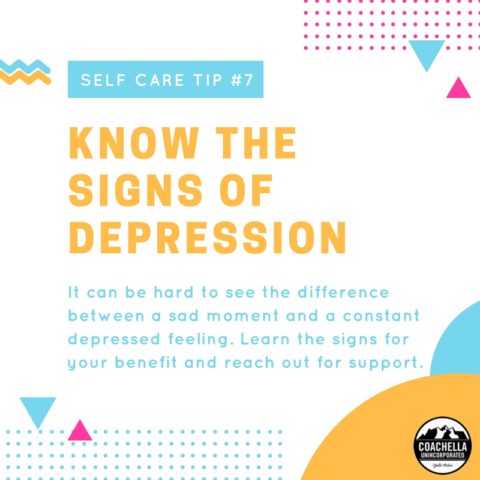
Self Care Tip #8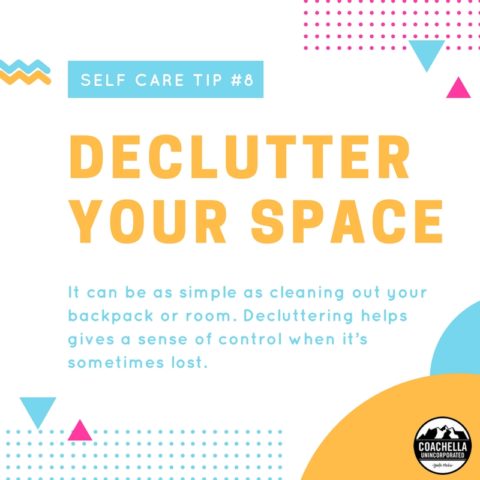
Self Care Tip #9
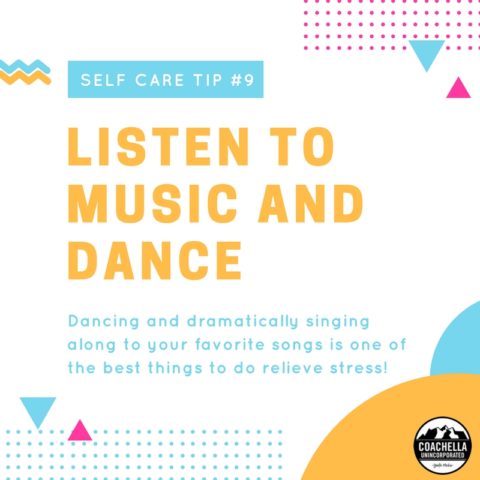
Self Care Tip #10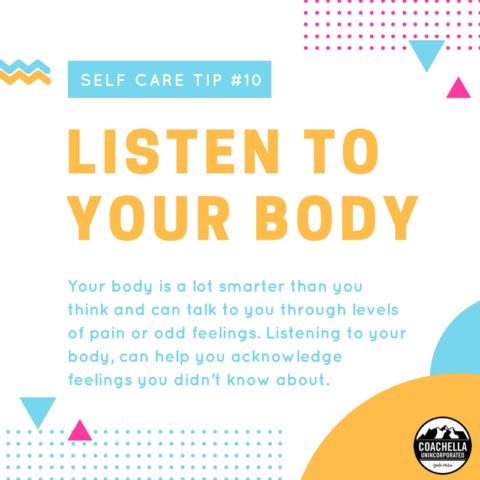
Self Care Tip #11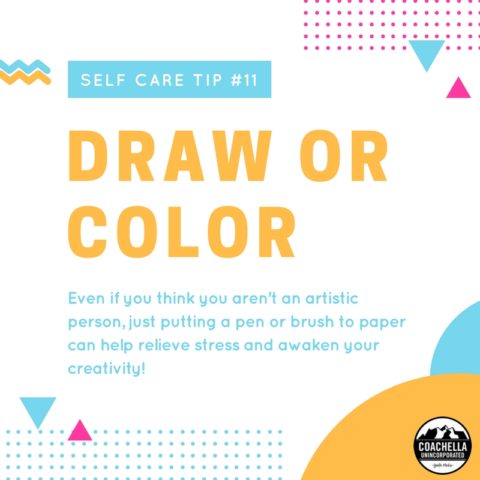
Self Care Tip #12
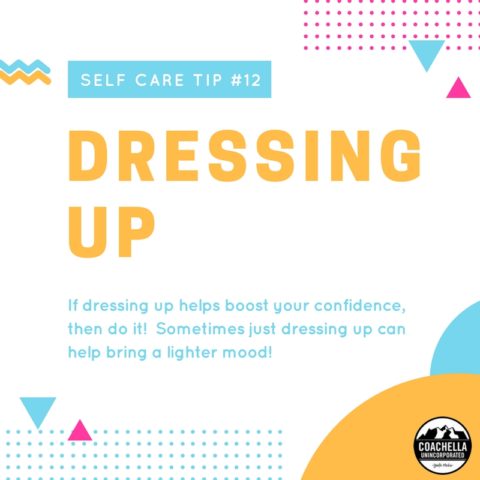
Self Care Tip #13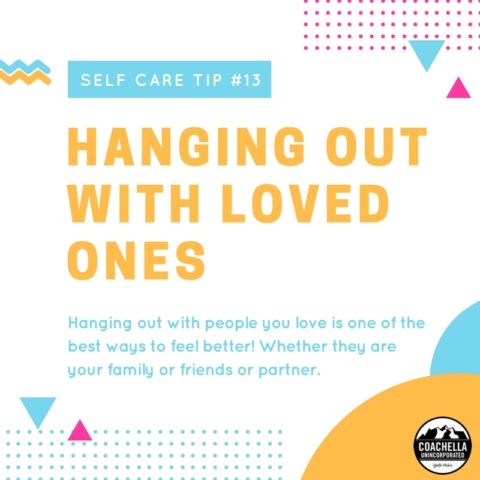
Self Care Tip #14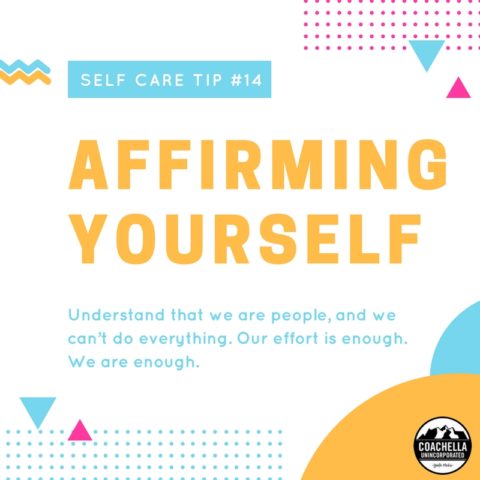
About the Author:
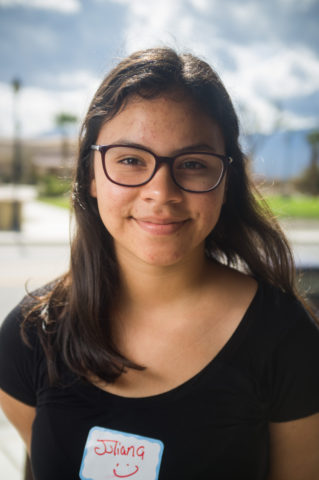 Juliana Taboada is a local Xicana poet and community activist. She originally grew up in Thousand Palms but moved to Mecca in 2013. She loves both her communities. She enjoys watching Netflix for hours and bursting out into Broadway and musical songs at any given moment. She is also awkward but very social and also loves pretzels.
Juliana Taboada is a local Xicana poet and community activist. She originally grew up in Thousand Palms but moved to Mecca in 2013. She loves both her communities. She enjoys watching Netflix for hours and bursting out into Broadway and musical songs at any given moment. She is also awkward but very social and also loves pretzels.
Editor’s note: Alma Ochoa is a Purépecha musician based out of the Eastern Coachella Valley. The Purépecha are a group of indigenous people originally from the state of Michoacan in Mexico. Their presence in the Eastern Coachella Valley dates back to around the 1970s, when few Purépecha spoke Spanish. Over the years the community struggled with both linguistic and cultural isolation. Ochoa, who sings in her native language, is one of only a few female Purépecha singers. She recently performed at The Hue Festival in Mecca, Calif. Coachella Uninc. program associate and reporter, Paulina Rojas sat down with Ochoa to find out how she helps preserve Purépecha culture.
Q: How long have you been producing Purépecha music?
A: About three or four years ago, I got inspired to start recording my own music. About two years ago, I recorded my first music video and a few months ago I released it on YouTube.
Q: What was the initial feedback like?
A: I wasn’t expecting so many people to like it. I was surprised, but I am happy that so many people are enjoying it.
Q: What inspired you sing in Purépecha instead of Spanish or English?
A: Most of the people that sing pirekuas (traditional music from Michoacan) are men and I wanted to change that … so that women might feel encouraged to make this music as well. With my music I hope to inspire young women to start doing the same. I also want preserve my culture in some way. Little by little we are losing parts of it due to the fact that it is being mixed with Spanish. I want to keep our culture alive so future generations can have the knowledge of what Purépecha culture is.
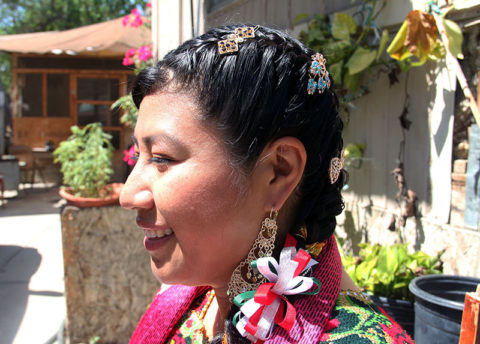
Q: Did you have to learn Purépecha or have you always spoken it?
A: I was born in Michoacan and Purépecha was my first language. Then my family and I moved to the United States when I was nine years old. After moving here I learned Spanish and a few years later I learned English.
Q: What are some of the obstacles you face as a Purépecha woman making music?
A: Well unfortunately there is a lot of racism against indigenous people. We experience it here (in the Eastern Coachella Valley) as well. I have heard many stories of young Purépechas being bullied in school because of the color of their skin. Even when you see main characters in novelas (soap operas) the main characters are always light skinned while the the roles of maids, gardeners and nannies are always played by darker skinned people. With my music I hope to help darker-skinned people take pride in who they are.
About the Author:
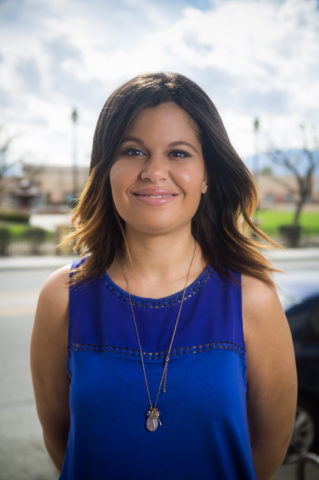 Paulina Rojas is a native New Yorker, Paulina has spent the past two years reporting on the Eastern Coachella Valley. She joined Coachella Unincorporated in 2016. While it is different from the concrete jungle of Manhattan, she feels right at home in Coachella. In 2014 Paulinagraduated with a journalism degree from The University of Houston and is a member of The National Association of Hispanic Journalists. View her author page here.
Paulina Rojas is a native New Yorker, Paulina has spent the past two years reporting on the Eastern Coachella Valley. She joined Coachella Unincorporated in 2016. While it is different from the concrete jungle of Manhattan, she feels right at home in Coachella. In 2014 Paulinagraduated with a journalism degree from The University of Houston and is a member of The National Association of Hispanic Journalists. View her author page here.
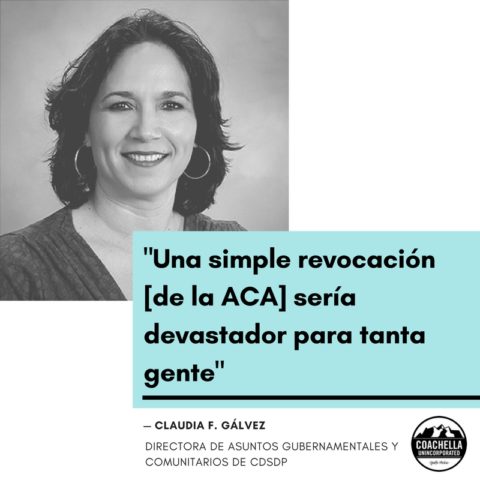 “Si TrumpCare deroga la ACA, revertirá la expansión de Medi-Cal, y si el Congreso no arregla el acantilado de atención primaria para este otoño, millones de personas en California perderán acceso a la atención médica, el estado perderá 27.000 buenos empleos y la economía perderá por lo menos $ 3,8 mil millones al año.
“Si TrumpCare deroga la ACA, revertirá la expansión de Medi-Cal, y si el Congreso no arregla el acantilado de atención primaria para este otoño, millones de personas en California perderán acceso a la atención médica, el estado perderá 27.000 buenos empleos y la economía perderá por lo menos $ 3,8 mil millones al año.
Aunque no hemos calculado el costo real de las Clínicas de Salud del Pueblo (CDSDP), debemos asumir que estaremos afectados por cualquier reducción de la financiación. Creemos que una simple revocación [de la ACA] sería devastador para tanta gente no sólo en el Valle de Coachella, sino en todo el país. Tenemos que creer que nuestros miembros del Congreso no quieren privar a nadie de su cobertura de salud. Trabajando con la comunidad, haremos todo lo posible para asegurar que nuestra fuerza de trabajo permanezca en el lugar y que podamos cumplir nuestra misión de servir a cualquiera en la comunidad “.
– Claudia F. Gálvez, Directora de Asuntos Gubernamentales y Comunitarios de CDSDP
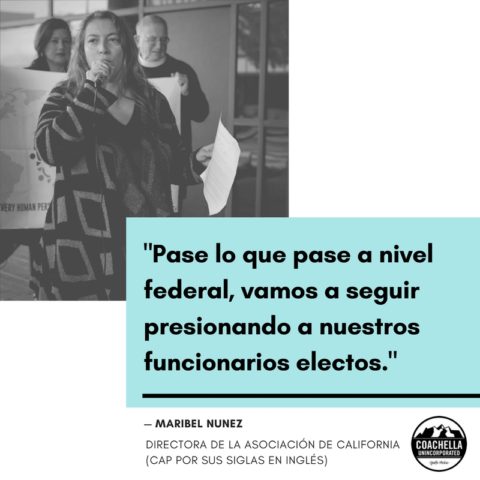 “La derogación de la Ley del Cuidado de Salud a Bajo Precio y la incorporación de la Ley Americana de Cuidado de la Salud realmente harán un cambio en donde la inversión va a ser hecha a largo plazo para Medi-Cal y también para mantener la expansión de Medi-Cal que un muchos de los bajos ingresos, personas de color en el Este del Valle de Coachella califican. Además, va a haber menos financiación en el largo plazo, debido a la forma de Medi-Cal va a ser reembolsado. Va a ser más de una subvención en bloque, que tiene un límite de cuánto está viniendo, en comparación con los fondos de contrapartida, que sería una cantidad mayor si el estado invierte más que el gobierno federal.
“La derogación de la Ley del Cuidado de Salud a Bajo Precio y la incorporación de la Ley Americana de Cuidado de la Salud realmente harán un cambio en donde la inversión va a ser hecha a largo plazo para Medi-Cal y también para mantener la expansión de Medi-Cal que un muchos de los bajos ingresos, personas de color en el Este del Valle de Coachella califican. Además, va a haber menos financiación en el largo plazo, debido a la forma de Medi-Cal va a ser reembolsado. Va a ser más de una subvención en bloque, que tiene un límite de cuánto está viniendo, en comparación con los fondos de contrapartida, que sería una cantidad mayor si el estado invierte más que el gobierno federal.
En el largo plazo, California se verá afectada si no recibimos los dólares federales de Medi-Cal. El estado va a tener que tomar algunas decisiones sobre si vamos a ser más estrictos sobre la elegibilidad para Medi-Cal y que podría disminuir la cantidad de personas que se puedan inscribir al programa. Y luego también tenemos que averiguar cuánto dinero vamos a tener que dejar para Health4All Kids y otros programas estatales que abren acceso a la atención de la salud para nuestra gente indocumentada.
Al final, pase lo que pase a nivel federal, vamos a seguir presionando a nuestros funcionarios electos y estamos planeando una serie de ayuntamientos aquí en el Valle de Coachella. Vamos a tener un ayuntamiento con el congresista Ruiz sobre este tema. Algunos de nosotros también estamos trabajando a nivel estatal para ver qué puede hacer el estado para invertir más de nuestro dinero para incluir la atención médica para todos “.
– Maribel Núñez, Directora de la Asociación de California (CAP por sus siglas en inglés)
]]>(Above: Alicia Benito sits her family home in Mecca, Calif. Benito works 50-60 hours a week in the fields of the eastern Coachella Valley to help provide for her children. Image: Paulina Rojas/Coachella Unincorporated)
By Paulina Rojas
Editor’s Note: Stories about female farmworkers often examine issues experienced by these women in their work environments, in the fields. There has been extensive reporting on the abuse and harsh working conditions these women face daily. But we rarely get to see what life is like for these hardworking women at home, off the fields. This story uplifts the voices of women who find themselves stuck in cycles of poverty, unable to find any moment for rest, and it looks at how traditional gender roles in farmworker communities only perpetuate that cycle.
MECCA, Calif. — Alicia Benito’s shift picking limes in the fields in and around Mecca, a rural community about three hours east of Los Angeles, starts at 8 a.m. But like a lot of female farmworkers, her day gets going long before first light.
“First I have to make lunch for the children, my husband and myself,” said Benito, a wife and mother of three, ages 9, 7 and 1. The family shares a rented one story house in a neighborhood surrounded by farm fields. “At 6:30 a.m. I wake up the kids and get them ready. At 7 a.m. I drop off the oldest ones at the school bus stop and then I take my youngest one to daycare.”
Benito is short and soft spoken, her hands are small but strong. She appears shy and serious at first but just a few minutes into our conversation she smiles and cracks a joke. Her laughter immediately brightens the mood of an unusually cold and dark winter evening.
After her whirlwind morning routine, Benito, 27, heads to the fields where she spends 8 or more hours a day crouched under trees and exposed to the harsh desert sun. She does this six days a week, often working 50-60 hour work weeks.
Benito says the back-breaking labor takes a physical toll on her, leaving her exhausted at the end of each work day. But when she gets home, there’s still no time to rest. Benito’s nighttime routine starts by preparing food and taking care of her children.
“When I get home, I make dinner … and then it’s time to get [my children] ready for bed,” she said. “I would like to spend more time with my children but I just can’t, not with my schedule.”
Working in the fields is not a career path she would have chosen, had there been other options. But for many women in the eastern Coachella Valley, career opportunities are limited, especially for those without a high school degree.
For Benito, the surrounding fields presented the only option for employment.
Since I didn’t finish school, my only option was to go work in the fields.” – Benito
Accurate data on farmworkers living in the eastern Coachella Valley is difficult to find. However, the United States Department of Labor conducted a National Agricultural Workers (NAWS) survey throughout fiscal year 2013-14 and found that only 17 percent of survey respondents reported that they had completed high school. Only 5 percent reported that they had college degrees.
Benito dropped out of school in the 8th grade to help her parents, who are also farmworkers, care for her five siblings because they could not afford childcare. She started working in the fields five years ago after she and her husband, who works in construction, began struggling with mounting bills. It’s the only work she’s ever done.
“We had a lot needs, there were a lot bills that needed to be paid,” she said. “Since I didn’t finish school, my only option was to go work in the fields.”
It is a relentless schedule, but by making $400 a week, Benito and her husband are able to make ends meet for their family of five. It’s times when she can’t work, like when she was pregnant, that things become difficult. Female farmworkers do not receive maternity leave, so during those months during and after the pregnancy Benito’s family was forced to rely on her husband’s paycheck.
“It was very difficult during those times with just my husband bringing in money, we had to find ways to really reduce our spending,” she said.
Nancy Gonzalez, community leader and volunteer with Lideres Campesinas, a non-profit that aims to educate and empower female farmworkers, says it’s common for female farmworkers to carry both financial responsibilities and the responsibility of caring for the family at home.
“Women dedicate themselves only to working and forget about things like academics and learning English,” Gonzalez said.
She added this cycle affects the whole family. If mothers are not able to pursue an education or develop their language skills, it makes it difficult for them to become involved in their children’s education.
“They can’t help their children succeed because they don’t know the language,” Gonzalez said. “It is frustrating for both the mother and the child. Field work does not leave women with good options.”
Sandra Ramirez, 40, spent more than 10 years working in the agricultural industry, harvesting everything from dates to table grapes and mangoes. Three years ago she stopped working in the fields to spend more time with her four sons and to pursue a college degree.
“I decided to stop working in the fields, mostly for my sons,” she said in Spanish. “Sometimes they tell me that they want to go work there too and I tell them no.”
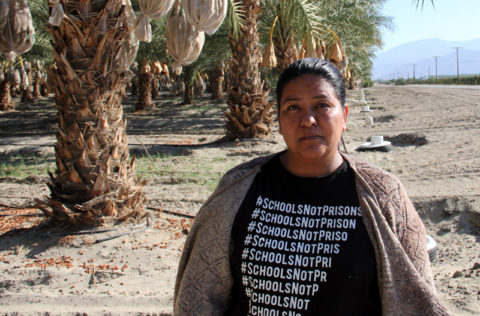
Like Benito, Ramirez’s work on and off the field left her with very little time for her children and herself.
“When I worked picking grapes, I would wake up at 4 a.m., make my lunch and head out to work at 5 a.m,” she said. “Then I would come home, make dinner, clean and just make sure that everything was in order.”
Ramirez said she has more time to be involved in her children’s education, now that she has stopped working in the fields. She has become a leader in her community, encouraging other parents in the eastern Coachella Valley to become involved in advocating for their children’s education.
Ramirez said leaving the fields was one of the most valuable lessons she was able to teach her sons.
“I want to show them that they have more options, that they can do more,” she said.
Though she no longer works in the fields, Ramirez said she sees how traditional gender roles that are prevalent in the eastern Coachella Valley add to the burden that female farmworkers face on and off of the fields.
“For women, it is harder. We can’t just come home, drink a beer, watch TV and relax,” she said. “We still have to make sure everything is done around the house.”
For women, it is harder. We can’t just come home, drink a beer, watch TV and relax” – Ramirez
Gonzalez said these traditional gender roles make it difficult for women in farmworker communities to see themselves as agents of change. But Lideres Campesinas is working to change things. The grassroots organization regularly holds meetings throughout the eastern Coachella Valley to educate women on their rights at work and at home.
“We teach women about physical and emotional abuse but also about equality in the home,” Gonzalez said, adding reaching the men is a tougher challenge. “[But] many of the men in our community are ‘machista’ and they don’t feel the need to come to our meetings.”
Gonzalez said they want to bring men into their meetings to show that equality in the home is important for the well-being of the whole family.
For now, working in the fields is a necessary sacrifice Benito makes so that her children can have a better future and hopefully become the first in their family to graduate from college.
Benito, who is originally from Mexico, recently gained citizenship and said she would someday like to go back to school.
“I don’t know exactly what I want to study but I would like to enroll in a program that I could finish in a few years,” she said. “With the kids I won’t have too much time to finish a long program.”
In the meantime, she plans to continue working the fields to support her family and hopefully ensure that her kids have other options.
“I have to work so we can have a better life, everything I do is for my kids,” she said. “I want them to study, I don’t want them to struggle as much as I have. I want them to achieve all the things that I haven’t.”
View this extended video interview with Sandra Ramirez to learn more about the lives of female farmworkers on and off the fields:
*This story was produced as part of the Marguerite Casey Foundation Equal Voice Journalism Fellowship.*
About the author:
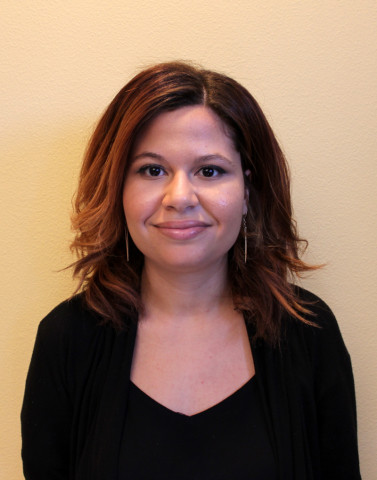 Paulina Rojas joined Coachella Uninc. as a beat reporter in February 2016 after working as a city reporter in the eastern Coachella Valley for more than a year. Although born and raised in New York City, Paulina feels right at home in the eastern Coachella Valley. She loves the warmth of the people and buying fresh bread from her favorite bakery in downtown Coachella. Paulina is a graduate of the University of Houston, and her work has appeared in The Las Vegas Review – Journal, The Houston Chronicle, HelloGiggles and Vivala. View her author page here.
Paulina Rojas joined Coachella Uninc. as a beat reporter in February 2016 after working as a city reporter in the eastern Coachella Valley for more than a year. Although born and raised in New York City, Paulina feels right at home in the eastern Coachella Valley. She loves the warmth of the people and buying fresh bread from her favorite bakery in downtown Coachella. Paulina is a graduate of the University of Houston, and her work has appeared in The Las Vegas Review – Journal, The Houston Chronicle, HelloGiggles and Vivala. View her author page here.
Indigenous peoples have been on the frontline fighting for environmental justice issues to protect the land that we all share. It’s time to end the ongoing illusion that we are separate or detached from global/national problems, especially in today’s heavily globalized world. We are more interconnected than ever so even though we are not in North Dakota, allowing the expansion of an oil pipeline that will cut through numerous rivers and culturally important territories is an issue for all who want to protect the land and stand in solidarity with indigenous populations of the world.
— Angel Melgoza
Nature is a gift for all people but it’s taken for granted. The pipeline in North Dakota will lead to the decline of everyone’s resources on the earth and pollution will continue to worsen with the growth of the oil industry. The earth is not just one person’s home, it’s everyone’s home.
— Alejandro Meza Aguilar
The struggle to respect our land has been a struggle that many indigenous people have fought world wide. The DAPL impacts us here in the Coachella Valley because we also have local tribes who have issues with land and water. We should acknowledge the indigenous people in North Dakota and those here at home. It is always important to include the native people of this land.
— Anselmo Montez
A human can go without water for about three days. Water doesn’t abide by the borders created by humans. Water travels the world via the water cycle and knows no borders. Not only do we need water to survive, we need clean water. At least 60 percent of our bodies are composed of water. By allowing corporate interests to contaminate our water whether it is in our community or in a distant part of the earth we are allowing them to contaminate our food systems and our bodies.
— Araceli Beltran
Even though we’re not in North Dakota we do have tribes around here. So if the oil companies are showing they don’t care about treaties or policies or the law even, then what’s going to stop them from treating our local tribes in the same way? It’s disrespectful and the oil companies are disregarding everything just to make a profit.
— Alondra Jimenez
The US has a very long history of disrespecting and mistreating Native Americans and this is just another instance where an oil company thought, ‘It’s OK. No one is going to say anything.’ But there have been protests, like the one in LA recently. The whole situation is just so bad. It just makes me angry.
— Juliana Taboada
What stands out to me the most about he DAPL protest is how the protestors and the people there are being treated by the police and by the people trying to break up the protests. That kind of treatment gets normalized throughout history and it’s still happening today. That is something that can relate to anyone.
— Melissa Montez
Water is sacred and whatever violations are done to our water are ultimately done to every living thing on our planet. It doesn’t matter how close or how far you live from North Dakota, the water that they’re protecting is the same water that runs through the earth. It’s upsetting that just because our water doesn’t have a voice there are some people who think it’s ok to abuse it.
— Olivia Rodriguez
What do you think about non-native groups, like Black Lives Matter, joining the Dakota Access Pipeline protesters?
I think it’s so awesome that people of color are coming together because I don’t think a lot of people tend to realize our liberation as Chicanos or Chicanas is directly connected to any other person of color’s liberation. Once they are free, we’ll all be free. When we see the Black Lives Matter movement joining the Dakota Access Pipeline protest it’s just so grand and large and it shows that we are going to stand in solidarity with each other because we all matter.
— Juliana Taboada
I think it’s powerful and necessary for people of color to come together. Solidarity equals power and power equals change. I think we can see the importance of people power and bringing people in to help support the cause, especially if anything ever happens here.
— Melissa Montez
It’s powerful to see BLM organizers joining the DAPL protest. We all have unique experiences of injustices that we face as a result of the oppression of our people throughout history, but it’s so impactful to see people come together and be aware of how our struggles are connected. I remember hearing a statement earlier this year that really stuck with me. Brittany Packnett, a BLM activist said, ‘We need to stop calling ourselves minorities, we’re the global majority.’ Collectively, we can do anything.
— Olivia Rodriguez
I believe people of color are stronger together, and seeing BLM organizers join the DAPL protest is something beautiful. Groups of color have been divided in the past and even today by arguments of which group is the most oppressed in the United States. This is nothing more than a distraction placed to divide us and distract us from pursuing important issues like freedom, justice, equity and more. I am excited about BLM joining the DAPL protest and about the infinite possibilities in future collaborations between people of color.
— Araceli Beltran
People of color uniting to protest against the DAPL shows the gravity of the situation. In unison we can find a pathway to peace and environmental improvement.
— Alejandro Meza Aguilar
The fact that people of color, specifically Black Lives Matter (BLM), have come together to join the DAPL protest is empowering. Having historically marginalized communities come together as one in order to protect what is significant for each other is an act of solidarity and respect among the groups. More importantly, however, to stand together as one against militarized police officers is an act of resistance and decolonization.
— Angel Melgoza
It is important for there to be solidarity amongst mobilization efforts made by people of color. Black Lives Matter is a big movement that has brought a lot of media attention. I believe it will positively impact the struggle that is being dealt with in North Dakota.
— Anselmo Montez
I think as people of color both groups can relate to each other and the treatment they’ve received from the US. It’s important for people of color to join together to make a statement. More people eqauls more power and it’s cool that they are saying people of color deserve to be treated equally.
— Alondra Jimenez
Responses have been edited for clarity and length.
]]>By Paulina Rojas
OASIS, Calif. — As soon as the sun starts to set in Oasis, a rural community in the eastern Coachella Valley, locals flock to the community’s first park, a simple soccer field with a gravel track around its perimeter that opened just a few months ago.
Children run about as mothers chat and teenagers hang out with their headphones on. Others bring snacks to share. This would be considered a normal scene in many other communities, but in this area it borders on revolutionary.
“A lot of cars pass by here and all the mothers would worry that something could happen to their children, since [before the park] there were no safe places to play,” said Rosalba De La Cruz-Olivarez, an Oasis resident and community leader with Inland Congregations United for Change (ICUC).
Speaking in Spanish, De La Cruz-Olivarez said the park has not only created positive change among the children in her community but among adults as well.
“I have noticed a big difference in how the people here feel, everyone seems a lot happier because there is finally a place for us to go sit for a little while, outside of our homes,” Olivarez said.

Before the opening of the park, residents of Oasis would have to drive about 20 miles west to Coachella to get to the nearest outdoor public space. Which presents an obstacle for the many residents here who don’t own cars, in an area where access to public transportation is extremely limited.
While there are a number of parks in Coachella today, there was a time not too long ago when that wasn’t the case.
“You drive by the parks in Coachella and there is always a ton of people and then some,” said Assemblyman and former mayor of Coachella, Eduardo Garcia. “We are at a point where there is a park in just about every segment of the city and it is how a well planned city should be.”
When Garcia initially took office one of the first things he noticed was the lack of park space, and so he started to ask questions.
“I learned as mayor of Coachella in 2006 and when I was elected to the city council, two years prior that the population of the city had grown based on the development, but that the park space had not grown along with it,” he said. “I began to ask why that was.”
Now, 10 years later Garcia takes note of the positive impact parks have had on his city, and he is now using that to push for statewide legislation that would help bring similar benefits to more communities.
“We made the case that the investment of a $3.2 million dollar park bond will have a return on investment and address issues of quality of life and the health and wellbeing of people” he said.
The park bond – AB-2444 – is currently stalled in the state senate. But that does not mean Garcia has halted his efforts.
“We start with the park discussions for next year, this year already,” he said. “We’re going to have a couple of park hearings in our district and throughout the state to begin generating additional support.”
That support and community buy-in from all stakeholders is what led to the Oasis park being built.
“(What made the park a success was) the creativity and willingness of different sectors –government, non-profit, residents – to work together with a ‘can-do’ attitude,” said Silvia Paz, vice president of Desert Recreation District.
“Open space has a tremendous impact on community well being; having access to parks and recreation has been associated with improved mental and physical health, and it also offers youth a safe place to convene.”
Paz added that the park in Oasis is one of three being planned for the Eastern Coachella Valley. Funding is still being secured for completion of the park, which will include a basketball court and a play area with swings.

Back in Oasis, De La Cruz-Olivarez shared the details of the first birthday party that was held at the park a few weeks ago. A neighbor wanted to do something special for her son and everyone showed up.
“It was very beautiful to see everyone there together,” she said.
About the author:
 Paulina Rojas joined Coachella Uninc. as a beat reporter in February 2016 after working as a city reporter in the eastern Coachella Valley for more than a year. Although born and raised in New York City, Paulina feels right at home in the eastern Coachella Valley. She loves the warmth of the people and buying fresh bread from her favorite bakery in downtown Coachella. Paulina is a graduate of the University of Houston, and her work has appeared in The Las Vegas Review – Journal, The Houston Chronicle, HelloGiggles and Vivala. View her author page here.
Paulina Rojas joined Coachella Uninc. as a beat reporter in February 2016 after working as a city reporter in the eastern Coachella Valley for more than a year. Although born and raised in New York City, Paulina feels right at home in the eastern Coachella Valley. She loves the warmth of the people and buying fresh bread from her favorite bakery in downtown Coachella. Paulina is a graduate of the University of Houston, and her work has appeared in The Las Vegas Review – Journal, The Houston Chronicle, HelloGiggles and Vivala. View her author page here.
MECCA, Calif. — Many residents of the eastern Coachella Valley want to vote but don’t have a way to get to the polls. Those without cars are often forced to walk more than a mile to the nearest bus stop or to pay $20 or more for a ride to their closest polling place.
For people in rural communities, lack of transportation can be one of the biggest roadblocks to voting.
Luckily, there’s an easy way for them to vote: casting a ballot by mail. When registering to vote, constituents can to request a vote-by-mail ballot.
“The vote by mail process can be more convenient for voters who are unable, or unwilling, to contend with going out of their way on Election Day,” said Luz Gallegos, community programs director at TODEC (Training Occupational Development Educating Communities) Legal Center. “Specifically in the Eastern Coachella Valley where [there is a] lack of infrastructure, with transportation being one of headlining issues, the vote-by-mail option is more convenient for residents.”
Juan Torres of Mecca is one of the residents who has opted for a mail-in ballot, although he still prefers to drop it off at his polling center.
“Although I have the vote-by-mail ballot, I still drop it off at a polling place because I would rather go in person, even if I have to pay someone to give me a ride,” he said in Spanish.
Gallegos said that in recent years, she has noticed more people like Torres opting for a vote-by-mail ballot.
“After people understand their options and the electoral process, more people are choosing to vote by mail,” she said.
But Gallegos said many residents still are unaware that voting by mail is an option.
Torres is 78 and does not have a car. He became a U.S. citizen a few years ago and didn’t know he could vote by mail. But now, he says, he is proud to be able to do it.
“I feel honored that I am able to vote in these elections,” he said. “I never thought I would be able to.”
The deadline to register to vote is October 24. If you are already registered to vote but would like to request a vote-by-mail ballot, you have until November 1 to do so.
For more information on registering to vote in Riverside County, visit www.voteinfo.net or call 951-486-7200.
About the author:
 Paulina Rojas joined Coachella Uninc. as a beat reporter in February 2016 after working as a city reporter in the eastern Coachella Valley for more than a year. Although born and raised in New York City, Paulina feels right at home in the eastern Coachella Valley. She loves the warmth of the people and buying fresh bread from her favorite bakery in downtown Coachella. Paulina is a graduate of the University of Houston, and her work has appeared in The Las Vegas Review – Journal, The Houston Chronicle, HelloGiggles and Vivala. View her author page here.
Paulina Rojas joined Coachella Uninc. as a beat reporter in February 2016 after working as a city reporter in the eastern Coachella Valley for more than a year. Although born and raised in New York City, Paulina feels right at home in the eastern Coachella Valley. She loves the warmth of the people and buying fresh bread from her favorite bakery in downtown Coachella. Paulina is a graduate of the University of Houston, and her work has appeared in The Las Vegas Review – Journal, The Houston Chronicle, HelloGiggles and Vivala. View her author page here.
By Karen Borja
Convincing a government agency to meet you on your own turf is a win for professional organizers. A meeting in a community, as opposed to a distant government office, shifts the power dynamic, allows locals an opportunity to host and makes it impossible to deny that certain needs are or aren’t being addressed – after all, seeing is believing.
So it was a victory for North Shore residents to receive a visit from county officials in 2012 to discuss transportation needs. The five officials arrived late, spilled out of their van, sweaty, and red in the face exclaiming, “We got lost! We didn’t even know North Shore existed.”
A community leader whispered to me in Spanish, “How are they supposed to provide us with services if they don’t even know we exist?”
That meeting proved to be a turning point. From then on North Shore residents understood that they had to organize to remove the distance that existed between them and their visitors.
The 45-year-old PICO (People Improving Communities through Organizing) organizing model I use to train people holds that a protest would alienate. Instead, it suggests that residents need to forge relationships to prove their existence and win support for their cause. Using the PICO approach, North Shore residents committed themselves to building relationships with decision-makers by attending and hosting meetings where they could share their testimony on day-to-day experiences with difficult local themes.
In my work I often ask residents what they like and dislike about their communities and I follow up by asking, “What can you do to change things?” I’ve heard thousands of answers over the course of my five-year organizing career in the Inland Empire. The answers that provoke the most tears and deepest desperation are those that come from the Eastern Coachella Valley, where people are struggling to survive the intense hardships of extreme poverty.
In helping them to meet these challenges, I try to unlock the power they hold. It is the hardest part of my job. But that inner power is displayed when a shy, immigrant, monolingual mother publicly shares how even the slightest improvements to transportation in her community will save her family thousands in college tuition because it will allow her son to finish a degree in not more than four years. It is apparent when kids, parents, and soccer coaches convince local government to convert an abandoned, neglected school into the unincorporated area’s first park.
After 11 years of engaging in community organizing, I know unlocking the power of people is what will continue to move any community forward.
Right now, that power is seen in the group of ECV mothers calling on their school board to build a new elementary school instead of doubling the size of the local continuation school. After three years of organizing neighborhood residents, these mother can now see that their efforts led to an investment that will help their community’s future in more ways than just education.
I write this as a testament that community organizing works and is something many places desperately need. No one was talking about these communities, let alone their people, until residents started sharing their testimonies publicly.
As the first mobile clinic rolls through North Shore, and the first park for the community of Oasis is being opened it is important for me to step into the background and shine the spotlight on the residents who organized and are helping make their neighborhoods better for everyone.
There is an expression in Spanish that translates to, “there is no worse effort than the one that was never made.” I have heard this from so many involved in community organizing in poor neighborhoods. People have used it at times when our organizing efforts are at their dimmest.
There is always a sense of pride when we claim victories in the Eastern Coachella Valley because I realize then that I have allowed myself to be lead to victory by the community. Community organizing unlocks the power of people and creates change in our communities.
About the author:
Karen Borja is the Associate Director of Inland Congregations United for Change (ICUC). She was born and raised in Coachella, and has been involved in community organizing since 2006. She can be reached at [email protected]
If you would like to be a community contributor, email us at [email protected].
]]>
By Paulina Rojas
COACHELLA, Calif. – “There wasn’t a time when I realized, ‘Hey I’m gay,’” says Alejandra Zamora, a community activist and member of the indigenous Purepecha community. “I always knew that I was very different.”
From the time she was a teenager, Zamora, now 24, refused to fit the mold of traditional gendered expectations that her community had set for her. Her environment, she notes, “made me see how different I was and that kind of forced me to come out.”
I met Zamora at a local French restaurant in La Quinta. Over a plate of French toast she tells me about her career plans. She is currently studying political science at College of the Desert, and plans on becoming a lawyer. Her purple hair framing her warm eyes. She also shared with me that she enjoys writing poetry and going for hikes.
Then she told me her story, about growing up queer and Purepecha, and the challenges of being gay in the eastern Coachella Valley.
The Purepecha are an indigenous group from the Mexican state of Michoacan. Ardent Roman Catholics, they are known for their artwork, including ceramics and woodwork. There are about 2000 Purepecha living in the Coachella Valley, mostly in Duros and Chicanitas, two trailer camps on the Torres Martinez reservation. Many work in the surrounding fields and speak little to no Spanish or English.
Zamora grew up in Thermal with a single mother who raised her and her brothers while working as many as three jobs to keep food on the table and a roof over her children’s heads.
“Often times we were left on our own ‘cause my mother had to work so much,” Zamora says.
Coming out under these conditions was not easy, she admits, even though she had the support of her brothers and cousins. “I was trying to avoid being hurt. I was already being told, ‘If you wear shorts and you’re showing your legs, you’re a slut … If you have guy friends you’re a slut.’”
Zamora’s voice is unwavering as she relates her experience, including the time she witnessed a group of students at her high school trying to purge a classmate of “evil spirits” because they believed he was gay.
Such memories are what fuel her current activism. “It made me realize there’s a lot that can be done,” she said.
Aside from her focus on LGBTQ issues in the eastern Coachella Valley, Zamora also advocates on behalf of undocumented immigrants and is an outspoken champion of environmental causes.
She says education and creating safe spaces are the two biggest priorities when it comes to addressing the needs of the LGBTQ community in Coachella.
“From my experience growing up, I wish we had community centers” she says. “That’s something we lack in the east valley.”
Having an LGBTQ center would mean the availability of much needed services, including but not limited to education on LGBTQ issues and counseling, she says. It would also help establish safety zones for LGBTQ members in the east valley.
In addition, she believes that elected officials and local decision makers need to get involved in conversations about the LGBTQ community in the east valley.
“What are our (political) leaders doing for members of the LGBTQ community?” she asks.
Although she has developed a thick skin over the years, Zamora says she still feels the sting of discrimination, like when she and her fiancée were looking for a venue to host their wedding reception. Zamora says it took a lot of time and effort even to secure an appointment to view possible locations.
She also described the disapproving stares while doing things that many heterosexual couples might take for granted, such as going for dinner or kissing each other goodbye.
Still, her message to those just starting to come to terms with their sexual identity is to stay strong and to keep fighting.
“Be confident about who you are, no matter how many hurtful things you go through,” she said. “If you remain in the shadows nothing will change.”
About the author:
 Paulina Rojas joined Coachella Uninc. as a beat reporter in February 2016 after working as a city reporter in the eastern Coachella Valley for more than a year. Although born and raised in New York City, Paulina feels right at home in the eastern Coachella Valley. She loves the warmth of the people and buying fresh bread from her favorite bakery in downtown Coachella. Paulina is a graduate of the University of Houston, and her work has appeared in The Las Vegas Review – Journal, The Houston Chronicle, HelloGiggles and Vivala. View her author page here.
Paulina Rojas joined Coachella Uninc. as a beat reporter in February 2016 after working as a city reporter in the eastern Coachella Valley for more than a year. Although born and raised in New York City, Paulina feels right at home in the eastern Coachella Valley. She loves the warmth of the people and buying fresh bread from her favorite bakery in downtown Coachella. Paulina is a graduate of the University of Houston, and her work has appeared in The Las Vegas Review – Journal, The Houston Chronicle, HelloGiggles and Vivala. View her author page here.
]]>